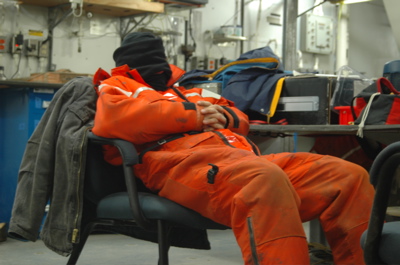( Log In ) Log In is for TREC Teachers & Researchers only
  |
| Steve_Stevenoski |
 Aug 13 2006, 01:58 AM Aug 13 2006, 01:58 AM
Post
#1
|
|
Member   Group: TREC Team Posts: 27 Joined: 19-July 06 Member No.: 39 |
August 7, 2006
We deployed the cage and seismic guns at about midnight. The whole process has become easier as everyone becomes more familiar with the gear, and how to handle things on deck. Safety briefs pay special attention to any changes made to the cage or guns. Catching a Few Winks  The initial ramp up of the guns went well, but after a short time only 4 GI guns and 1 Bolt gun were firing. The modifications we had made had helped, but we still had some work to do to get all the guns operating consistently. We had to get help from nearly everyone in the science labs to bring in the cage on deck when we ran into some hard ice. As the cage was lifted up onto the back deck, the protective tube dropped between the ship and the cage and had gotten pinched there. The flattening in the tube made it even more difficult to bring on board because the kink prevented it from bending. The MST's attached a line to pull it up. With seven people pulling, grunting and lifting, we were able to get it on deck. The repairs to the cage were minor. A couple new bolts to replace the stretched ones holding the GI guns. Using large pipe wrenches to hold the tube in position on the deck, we were able to pound the tube back into its original round d shape using a heavy sledge. The cage was redeployed and we continued to operate with five guns. After about 4 hours, we tried to bring the cage back on deck, but there was a problem with the A frame winch. The engineers had to do a manual override to get it to work from the winch room below the fantail. Fortunately, the problem was repaired and we were able to get the cage back into service very quickly. We continued to operate the guns and collect data until just after dinner. Some of the guns were not working at all. We knew that we had some problems with air hoses that need to be addressed, so we brought the cage on deck to make quick repairs. Once on deck, we discovered that two of the electrical connectors attached to the guns had been broken completely off the gun and that two air hoses were broken off the guns. This would take quite a bit of time to fix. Radio Check  We spent about an hour going over every gun, wire, hose and connector in the cage. We also carefully looked at the cage itself to determine why the connectors had broken. Was it ice? Were the breaks due to collisions between guns or with the cage? After careful inspection, we noticed that the bars high on the cage had new dings in the metal that had not been seen before. It became clear that as the cage was rotated in the currents behind the ship, at some point the chains holding the guns up became slack as the cage rotated 90 degrees or more causing the guns to fall "up" onto the upper part of the cage breaking the connectors. To prevent any future "collisions" of the guns with the cage, we decided to fashion arrestor cables that would prevent the guns from hitting the cage or another gun, but would not prevent their natural movement as the air is released. By midnight, we had the first arrestor cable in place. Dale and Mark were working on splicing the new connectors to the wire, and the air hose connectors had been replaced. There was still about 5 hours of work to do before the cage could go back into operation. Since we could not do seismic, we transited to a new coring site about 15 miles away. There we would take a piston core. |
  |
2 User(s) are reading this topic (2 Guests and 0 Anonymous Users)
0 Members:

|
NSF Acknowledgment & Disclaimer | Time is now: 12th November 2024 - 11:14 PM |
Invision Power Board
v2.1.7 © 2024 IPS, Inc.








